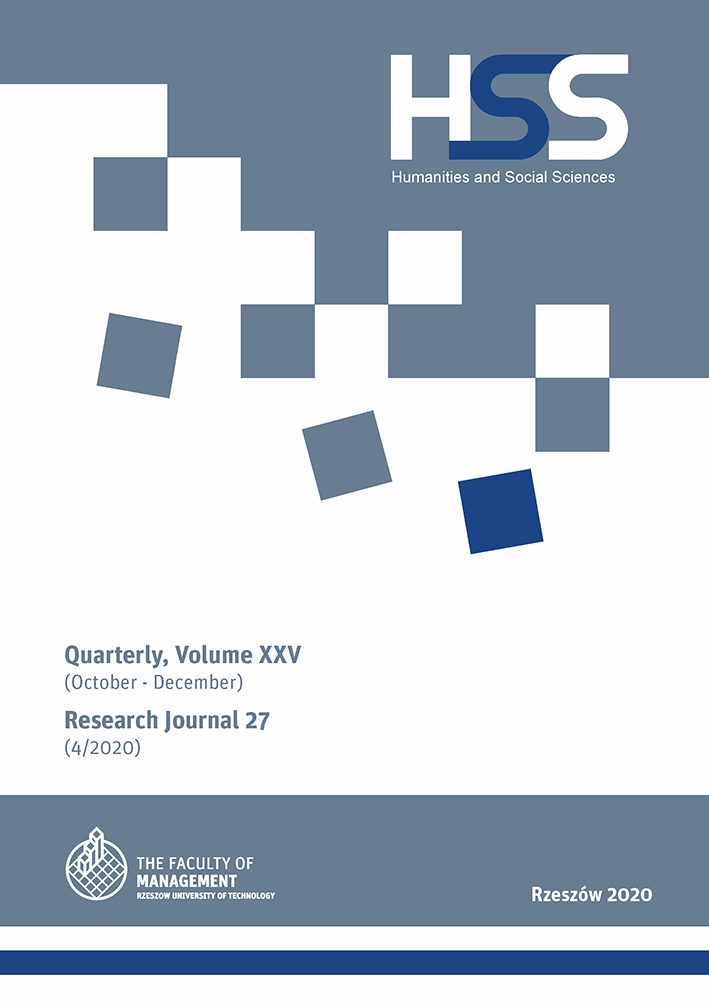Abstract
Although the phenomenon of exclusion has been present in our reality for thousands of years, it only became the point of scientific interest a quarter of century ago. It seems a vital issue since it may concern any citizen in any of their walks of life. They may become financially excluded due to their educational background, income, financial status, nationality, sex or even lifestyle. In practice, excluded individuals are deprived of performing certain social activities despite their abilities or willingness to do so. This paper is aimed at identifying the awareness of issues concerning financial exclusion in a group of males in Poland. It provides the outcome of a survey held in a research group of 898 males on the topic of perceived financial exclusion. Moreover, the study elaborates on the determinants of financial exclusion in Poland, as well as individuals or whole social groups potentially at risk, in the opinion of the male respondents. The results enhance the wider knowledge of financial exclusion in Polish society.
References
Anderloni, L. (2007). Access to Bank Account and Payment Services [in:] Anderloni, L., Braga, M.D., Carluccio, E.M., eds., New Frontiers in Banking Services. Emerging Needs and Tailored Products for Untapped Markets Berlin-Heidelberg: Springer – Verlag.
Corr, C. (2006). Financial Exclusion in Ireland: an Exploratory Study and Policy Review. Dublin: Combat Poverty Agency.
Demirgüç-Kunt, A., Beck, T., Honohan, P. (2008). Finance for All? Policies and Pitfalls in Expanding Access. Washington: International Bank for Reconstruction and Development / The World Bank,.
European Commission, 2008. Financial Services Provision and Prevention of Financial Exclusion, EC Report VC/2006/0183, Brussels.
Financial Inclusion Improving The Financial Health of The Nation (2015). Financial Inclusion Commission.
Giddens, A. (2004). Socjologia. Warszawa: Wydawnictwo Naukowe PWN.
Kempson, E., Whyley, C. (1999). Kept Out or Opted Out? Understanding and Combating Financial Exclusion. Bristol: Joseph Rowntree Foundation, Policy Press.
Leyshon, A., Thrift, N. (1995). ‘Geographies of financial exclusion: financial abandonment in Britain and the United States’, Transactions of the Institute of British Geographers, New Series, 20.
Mylonidis, N. Chletsos, M., Barbagianni, V. (2017). Financial exclusion in the USA: Looking beyond demographics. Journal of Financial Stability. DOI: 10.1016/j.jfs.2017.09.004.
Richardson, L., Le Grand, J. (2002). Outsider and insider expertive: The Response of Residents of Deprived Neighbourhoods to an Academic Definition of Social Exlusion. CASE Papers 57, London School of Economics, Centre for Analysis of Social Exlusion.
Russell, H., Maître, B., Donnelly, N. (2011). Financial Exclusion and Over-indebtedness in Irish Households. Social Inclusion Research Report. Dublin.
Sinclair, S. (2001). Financial Exclusion: An Introductory Survey. Centre for Research into Socially Inclusive Services (CRSIS). Edinburgh: Edinburgh College of Art/Heriot Watt University.
Sołtysiak, M. (2017a). Postrzeganie zjawiska wykluczenia finansowego przez młode pokolenie Polaków. „Ekonomiczne Problemy Usług” nr 127. DOI: 10.18276/epu.2017.127-26.
Sołtysiak, M. (2017b). Zjawisko wykluczenia finansowego w opiniach przedstawicieli pokolenia baby boomers. „Zeszyty Naukowe Wydziału Nauk Ekonomicznych Politechniki Koszalińskiej” nr 21.
The Little Data Book on Financial Inclusion (2018). International Bank for Reconstruction and Development / The World Bank, Washington.
Triki, T., Faye, I., eds. (2013). Financial Inclusion in Africa. African Development Bank (AfDB), Tunisia.
Weber M. (2002). Gospodarka i społeczeństwo. Warszawa: PWN.


